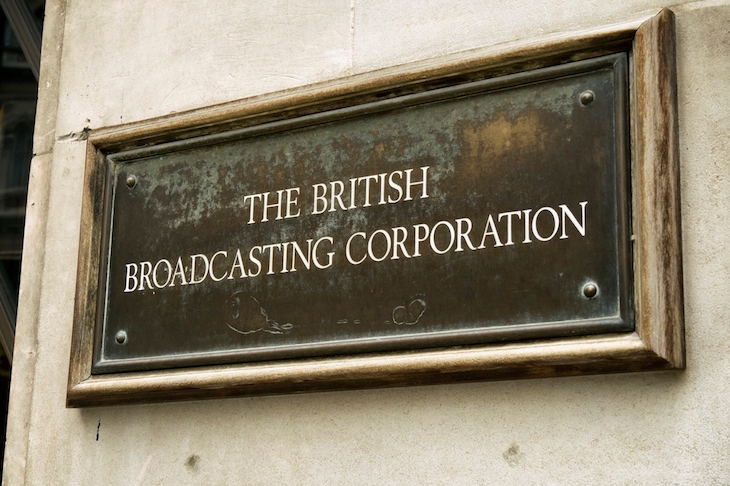The camouflage-painted, smoke-blackened entrance to London’s 1940s Broadcasting House, moated with sandbags and battered by bombs, provided its staff with a refuge from attack. Inside, a gender-segregating blanket divided the employees’ emergency dormitory in two. But such propriety masked the energy, idiosyncrasy and influence that ballooned within the Portland Place walls during the wartime years.
From the morning of 3 September 1939, when Neville Chamberlain used the wireless to announce that Britain was at war with Germany, the same day that the Alexandra Palace indefinitely shut down all television broadcasting, radio became the nation’s indispensable source of up-to-the-minute information. Although the Houses of Parliament and London’s poshest clubs had initially banned the use of the relatively newfangled machine, at the outbreak of war Britain’s wireless listeners numbered around 40 million (if you included those who listened in pubs) out of a population of 48 million. Images in the press of people at home wearing expressions of concentration, anxiety and occasional amusement while huddled around a wooden box became familiar.
In Edward Stourton’s fascinating, complex and exhaustively researched biography of wartime life at the BBC, an organisation for which he has worked for three decades, he studies documents marked ‘secret’, memos about broadcasters not to be trusted, and scripts scrawled with the censor’s tut-tuttings. The BBC had begun broadcasting in 1922, and in 1939, still in relative infancy, was viewed by many as a citadel for the privileged Oxbridge elite. Regional accents and women’s voices (except for Vera Lynn’s heart-lifting singing) were rarely heard on air and Penelope Fitzgerald’s hilarious novel Human Voices comes out of her subordinate wartime experience as a BBC secretary.
During the first uneasy year of conflict when the BBC was seen as hectoring and fussy, reminiscent of a spinster, ‘Auntie’ acquired her nickname. By 1940 almost all light-hearted entertainment had been removed from the radio service. News bulletins dominated the schedules, interspersed with live organ music played by Sandy MacPherson, whose interludes prompted exasperated listeners to say they would ‘rather face the German guns’ than listen to one more note from Sandy’s interminable organ.
But the war was instrumental in shaping the BBC that’s familiar to us today: its authoritative dependability coexisting with freedom of expression and creativity. Almost as soon as war was declared, a diverse range of personalities emerged, including established broadcasters like Churchill himself and the war correspondent Richard Dimbleby, as well as newcomers like J.B. Priestley and the American Edward R. Murrow. From the beginning of the war, the recurring challenge was how to gain the public trust. Given the ever-present security risk of divulging information to the enemy, the BBC sometimes struggled with the constrictions of its public pledge to ‘tell the whole truth, and nothing but the truth even if the truth is horrible’.
All programmes were subject to the censor’s pencil and influenced by the need for the positive spin, propaganda and even deception designed to boost morale and put the enemy off course. The mildest ad-lib made the Ministry of Information jumpy: an unscripted mention of sunny weather might tip off the Germans for the opportune timing of a bombing raid. However, despite the BBC’s reporting of the disastrous, morale-plummeting outcome of Dunkirk, one of the rare operational events to be deliberately minimised and shaped into something unrecognisably positive, Stourton explains how ‘through it all — the miracle of the BBC’s wartime story — runs a golden thread of truth-telling’.
With party politics suspended for the war there was more flexibility for independent opinion to offset the official line. J.B. Priestley, a socialist veteran of the first world war, was acutely aware of the destabilising power of competing Nazi broadcasts, in particular those of Lord Haw-Haw.
Priestley became an equally famous and possibly more popular broadcaster than Churchill, diluting the run of cut-glass voices and opinions with his ten-minute Sunday evening Post Scripts. Stourton describes how Priestley’s ‘instinct for the public mood and his seriousness about the public war are all reflected in these radio gems’. The evocation of the British countryside in spring with ‘the almond blossom so clear and exquisite against the moss-stained old wall’ could provide as much optimism, and reason for survival, as some of Churchill’s most inspirational oratory.
The appointment of George Orwell as the public’s voice of the BBC’s Indian Broadcasting service was something of a risk, his curious accession to a propaganda role at odds with his leftist politics; and yet his BBC experiences and the contemporary concept of ‘alternative facts’ emerged later in Ninety Eighty-Four.
As cumbersome recording equipment became streamlined and portable, on-site commentary convinced the audience of the veracity of reports. The empty eeriness of London in blackout was unmistakeable as Edward R. Murrow of America’s CBS held his microphone to the pavement so that listeners could hear footsteps sounding ‘like ghosts shod with steel shoes’. A broadcast which imagined the prospect of a Nazi-occupied Oxford remains terrifying even now. Richard Dimbleby made a hair-raising flight with an RAF bomber above enemy territory.
This is a book that travels far beyond the bomb-scarred walls of Broadcasting House, bringing the reader, as it did the 1940s listening public, the drama and immediacy of war, and eventually the reality of a post-Nazi world where Dimbleby’s pared-down description of the liberation of Belsen must be one of the most shattering pieces of radio ever broadcast.






Comments